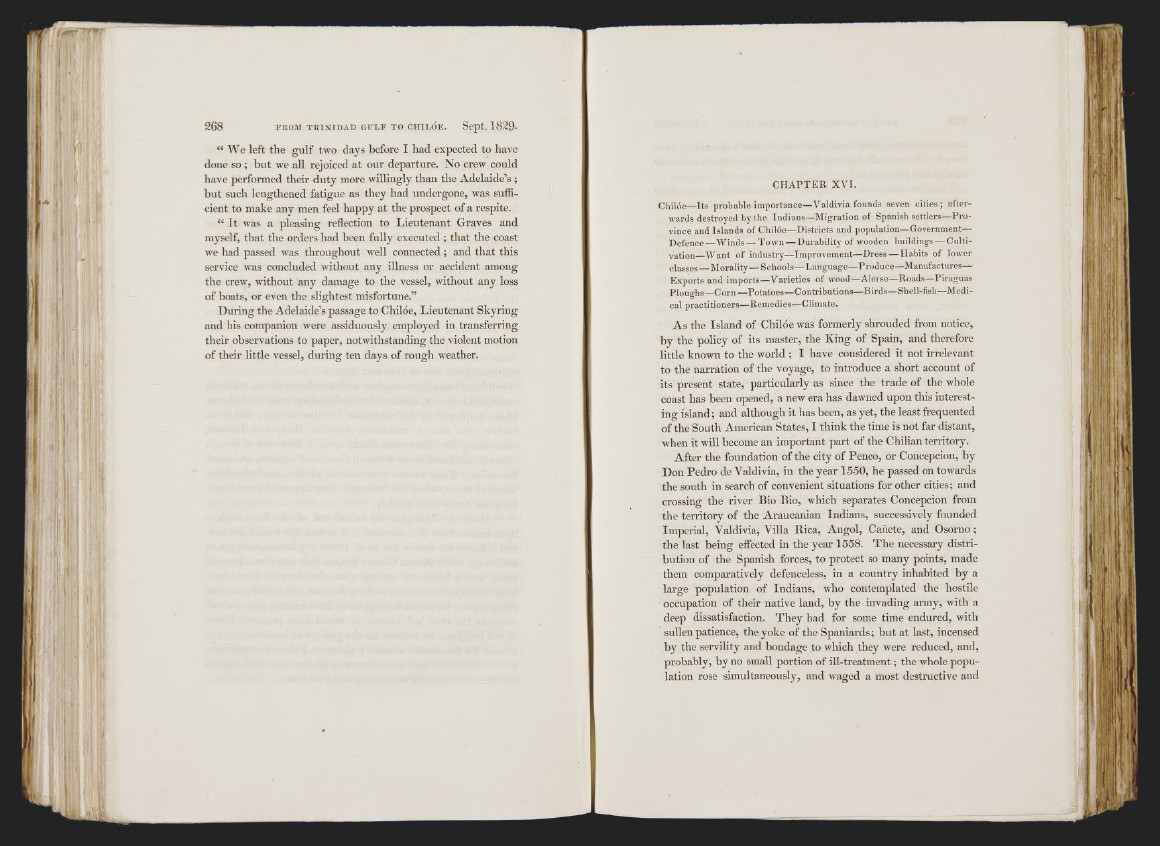
I t o
i ' ! ' íí
4" ' -i:
J i i i í f
“ AVe left the gulf two days before I had expected to have
done so ; but we all rejoiced at our departure. No crew could
have performed their duty more willingly than the Adelaide’s ;
but such lengthened fatigue as they had undergone, was sufficient
to make any men feel happy at the prospect of a respite.
“ It was a pleasing reflection to Lieutenant Graves and
myself, that the orders had been fully executed ; that the coast
we had passed was throughout well connected; and that this
service was concluded without any illness or accident among
the crew, without any damage to the vessel, without any loss
of boats, or even the slightest misfortune.”
During the Adelaide’s passage to Chiloe, Lieutenant Skyring
and his companion were assiduously employed in transferring
their observations to paper, notwithstanding the violent motion
of their little vessel, during ten days of rough weather.
Clnlóc—Its probable importance—Valdivia founds seven c itie s; afterwards
destroyed by the Indians—Migration of Spanish settlers—Pi-o-
vince and Islands of Childe—Districts and population—Government—
Defence'—Winds — T own — Durability of wooden buildings — Cultivation—
W an t of industry—Improvement—Dress — Habits of lower
classes — Morality— Schools— Language—Produce—Manufactures—
Exports and imports—Varieties of wood—Alerse—Roads—Piraguas
Ploughs—Corn —Potatoes—Contributions—Birds—Shell-fisli—Medical
practitioners—Remedies—Climate.
As the Island of Chiloe was formerly shrouded from notice,
by the policy of its master, the King of Spain, and therefore
little known to the world ; I have considered it not irrelevant
to the narration of the voyage, to introduce a short account of
its present state, particularly as since the trade of the whole
coast has been opened, a new era has dawned upon this interesting
island; and although it has been, as yet, the least frequented
of the South American States, I think the time is not far distant,
when it will become an important part of the Chilian territory.
After the foundation of the city of Penco, or Concepcion, by
Don Pedro de Valdivia, in the year 1550, he passed on towards
the south in search of convenient situations for other cities; and
crossing the river Bio Bio, which separates Concepcion from
the territory of the Araucanian Indians, successively founded
Imperial, Valdivia, Villa Rica, Angol, Cañete, and Osorno;
the last being effected in the year 1558. The necessary distribution
of the Spanish forces, to protect so many points, made
them comparatively defenceless, in a country inhabited by a
large population of Indians, who contemplated the hostile
occupation of their native land, by the invading army, with a
deep dissatisfaction. They had for some time endured, with
sullen patience, the yoke of the Spaniards; but at last, incensed
by the servility and bondage to which they were reduced, and,
probably, by no small portion of ill-treatment; the whole population
rose simultaneously, and waged a most destructive and